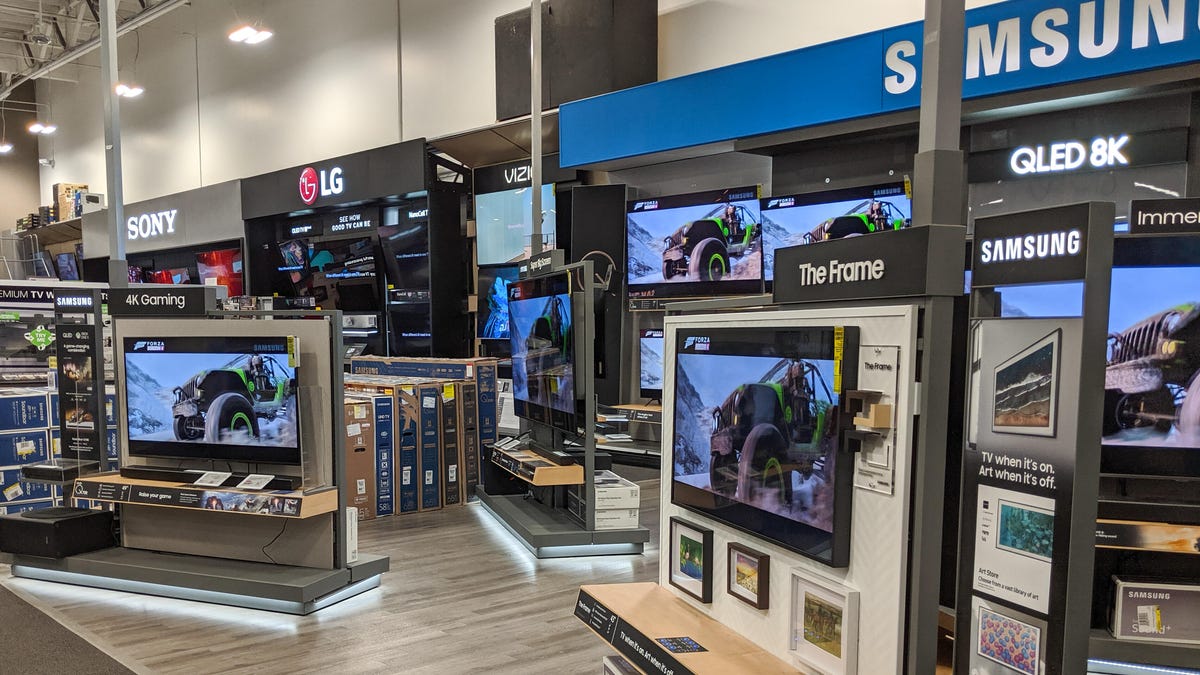 Why You Can Trust CNET
Why You Can Trust CNET Why TVs cost pretty much the same at every store and online
It's not a coincidence, it's something called Unilateral Pricing Policy. So what's UPP with that?

If you've tried shopping for a new TV lately, you may have noticed the prices are generally the same for each model of TV regardless of the store or online vendor selling it. That's neither a coincidence now accident. It's called UPP, or Unilateral Pricing Policy, and it's how manufacturers force retailers to stick to specific prices. That means there won't be as many crazy discounts, no random doorbuster deals on well-known models, and very little (let's be honest here) price competition. There are plenty of exceptions, of course, and not every store adheres to UPP, but most major retailers do.
Shockingly, this is legal. Read on for more info.
Why TVs cost the same everywhere
UPP isn't new. Apple and Bose have been doing it for years and more recently Samsung, LG, Sony and other TV makers have done it with TVs. What this means is if you're shopping for a new TV, Amazon, Best Buy, Walmart and your local electronics chain will likely all be selling it for the same price. Save your gas, or more likely your clicks, comparing different prices from store to store.
How is this legal? Good question. My lawerin' skills are limited to one class I mostly slept through in college plus a few Law & Order reruns, but here's what I turned up: While outright price fixing is illegal, a company can do business (or not) with whomever it chooses. So when a company says, "The UPP on this TV is $1,000" what it's really saying is, "If you charge less than $1,000 for this TV, we might stop shipping you TVs."
In other words, if you mention extortion again, I'll have your legs broken.
Sneaky, right? So if Sam's Screen Shack wants to sell a genuine Panaphonics TV at a loss to get people in the door, they absolutely can. However, Panaphonics can then choose to cut ties with the store.
The beauty of this is TV companies aren't allowed to pressure specific pricing, only imply a threat if the pricing isn't followed. An explicit threat would be price-fixing, an implicit threat is UPP. Huzzah!
Manufacturers claim UPP protects their dealers, and in a way that's true. For example, BuyCheapTVsNowLOLZ.com likely has neither a store that you can return to, nor any staff you can complain to. I'm sure Best Buy and its ilk likely have no issue with UPP because it allows them to charge a price that gets them a profit. That profit then supports physical locations and staff, plus reduces the instances of "showrooming," where customers check out a TV in a store, then buy it online.
Amazon was less enthused with the whole idea when it first started appearing. Ben Hartman, VP of consumer electronics for Amazon, was interviewed about UPP for Twice magazine in 2013.
"We believe in delivering the best possible value to our customers and we want Amazon to be the place they trust to find competitive prices. We also believe it is in the long-term interest of manufacturers to focus on providing a fair and transparent shopping experience that best meets the needs of customers. We do not believe price controls are in the best interest of customers or support innovation. In any event, Amazon will always set its retail prices independently."
Bottom line
The good news is there are a lot of great, inexpensive TVs out there. The price to picture quality ratio has never been better. However, the huge discounts on TVs during the holiday shopping season are generally limited to one-off TVs specific to a certain store.
But do keep an eye on sales. UPP doesn't mean TVs never go on sale, just that if there's a sale at one store, it's likely the same price drop at other stores.
As well as covering TV and other display tech, Geoff does photo tours of cool museums and locations around the world, including nuclear submarines, massive aircraft carriers, medieval castles, epic 10,000-mile road trips, and more. Check out Tech Treks for all his tours and adventures.
He wrote a bestselling sci-fi novel about city-size submarines, along with a sequel. You can follow his adventures on Instagram and his YouTube channel.

